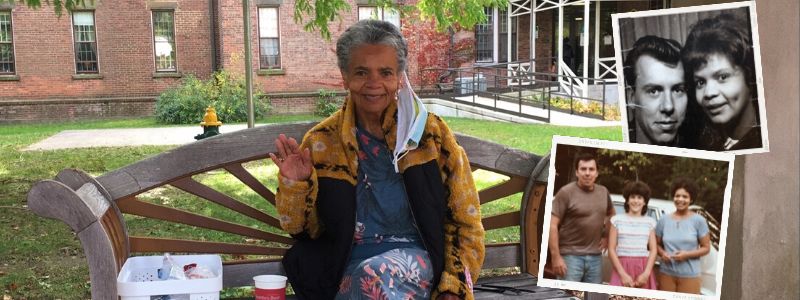 Caring for Aunt Harriett"
class="bg-img"
fetchpriority="high"
loading="eager"
decoding="async">
Caring for Aunt Harriett"
class="bg-img"
fetchpriority="high"
loading="eager"
decoding="async">
News from the Memory and Aging Program at Butler Hospital
July, 2022
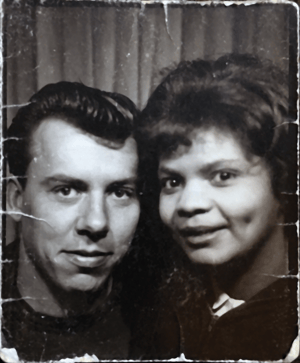 Harriett Chamberland met her husband, Bobby, the love of her life, in high school. They married in 1965 and built a beautiful life together in their hometown of Southbridge, Massachusetts, where Harriett had a long career making eyeglasses at the American Optical Company. The couple never had children but had a full life and were active and well-loved in their community for several decades.
Harriett Chamberland met her husband, Bobby, the love of her life, in high school. They married in 1965 and built a beautiful life together in their hometown of Southbridge, Massachusetts, where Harriett had a long career making eyeglasses at the American Optical Company. The couple never had children but had a full life and were active and well-loved in their community for several decades.
Sadly, eleven years ago, Bobby passed away after a three year battle with cancer. Harriett moved forward and learned to go on and live without him by her side. She retired, she traveled. She enjoyed afternoon coffees, dinners, exercising and communing with dear and lifelong friends. She also frequented and loved being a part of local New England Native American celebrations.
Then, in November, 2019 the Worcester police found Harriett in an unsafe situation, 22 miles from her home, sitting in her car with the door open in a state of confusion. Eventually, she was diagnosed with Alzheimer’s disease.
Luckily for Harriett, she found a supportive and loving home with relatives she hadn’t been strongly connected to in quite some time but who nonetheless jumped in to provide the care, help, and the companionship she needed.
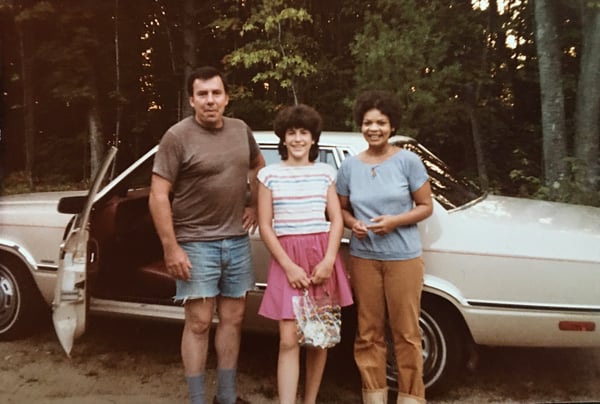
Bobby Chamberland, Anissa Zotos and Harriett Chamberland, during a visit when Zotos was a teenager.
It just so happened that at that time Anissa Zotos, Harriett’s niece, had just wrapped up a four-year commitment working as the Elementary School Counselor at the United Nations International School Hanoi, Vietnam. She was on hiatus, but due to the quick onset of COVID-19, decided to stay at her parents’ family home to help them weather the pandemic together, while also getting her Aunt Harriett settled and cared for.
“I’ve kept Aunt Harriett safe and healthy,” Anissa says. “We all stayed healthy and happy, and Aunt Harriett passed time by gardening, reading, writing out holiday and birthday cards to dear old friends, spending time with our family cat and dog, and taking drives in the Plymouth County area visiting farm stands, neighborhood book exchange depots, or sitting by the ocean. We’ve also been taking care of her unfinished life business, and making sure she’s cared for by getting the medical care she needs so she can feel happy, settled and have closure.”
“I’ve been in a caregiving role my entire adult life,” she says. “I have a degree in Intensive Special Needs and was a Behavioral Specialist for Tewksbury Public Schools for five years, working with children with Autism Spectrum Disorders. Then I became an international school educator and moved to Scotland where I worked as a Learning Support teacher before moving to my last post in Vietnam.”
Tom, Anissa’s father and Harriett’s brother-in-law, says he’s proud of his daughter’s compassion and commitment to her family and helping her Aunt through this stage of her life. Tom is not only Harriett’s brother-in-law, but they also went to high school together, and always have a lot to talk about, especially the good old school days, their mutual friendships, and all the old town happenings and stories they know and share together.
“It was a gallant gesture on Anissa’s part to say, ‘We’re all going to be sheltered in place so let’s do what we can for Aunt Harriett,’” he says. “My mother, her dearly loved Nana, had Alzheimer’s as well, and I think that’s why Anissa has such sympathy and empathy for her.” “Once she was stabilized here she was very alert, so we got to enjoy learning about her life and vice-versa,” Tom recalls.
“At the time we were all stuck and on lock down because of COVID and being elderly, we weren’t going out a lot to do things so we were all cooking and caring for one another and it wasn’t too big a stretch.”
But Tom says that over time, Harriett’s condition has deteriorated.
“Now Anissa is really having to be on top of everything. In the beginning, Harriett was much more independent. She was out walking 1,000 steps a day by herself, getting exercise and enjoying the outdoors, which was really good for her. But all that ended last winter when her Alzheimer’s started progressing,” he says.
“All of a sudden her Alzheimer’s symptoms really increased and it’s like her whole life – her thinking, ideas, movement and behaviors are all really mixed up now,” Anissa says. “She used to curl her hair every morning and now she can’t. She dressed herself every morning and put on different earrings each day, with matching colored hair bands, and now she can’t do that either. She needs considerable support to do her daily activities.”
“All these little things mean so much, and so we’re grieving that. There’s a lot of grieving every day, and I think she thinks about her husband a lot, who was the love of her life. We have recently put together a special photo box of her family, and every few days I ask Aunt Harriett if she would like to look through it. Some days she excitedly says yes, some days, she sadly says no. There are lots of ups and downs. We try to focus on the ups and give little attention to the downs.”
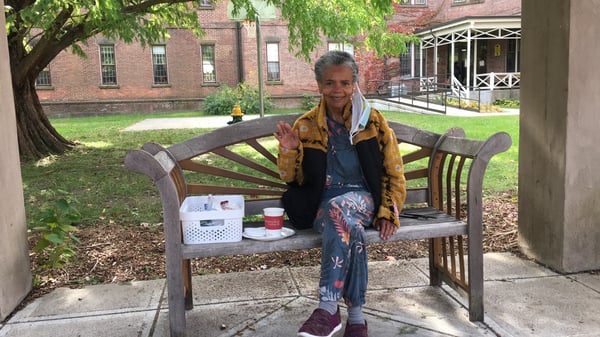
Harriett Chamberland sits outside Butler Hospital after a visit to participate in Alzheimer's research at the Memory and Aging Program.
“We’ve never missed an appointment, we are so dedicated to every visit,” she says. “Going down to Butler and turning onto that beautiful campus brings us joy. We love seeing all the foliage and trees as each season passes, and as we pass through and change, too. It’s a very safe, kind, and settling environment while facing a very unsettling disease and unknowing future ahead.”
“At some point soon she may need to go to a care home to have a higher level of care, but we’re not rushing it. With my background as a special education teacher, and counselor, I know it’s all about adaptation. It’s not easy, but every day we wake up and say, ‘How are we going to face today, what are we going to do?’ and we stay positive. There are so many things you can do, you just have to be creative and remember to keep it simple,” Anissa says.
“We play music on the Golden Oldies channel on TV because they show a picture of the artist and that helps Aunt Harriett to remember who sang that song. We got her a bright visual calendar that’s digital and has the date, day and time on it so she always knows what day it is. She used to love taking out all of her earrings and looking through them but they were getting lost everywhere and causing her stress, so I found fashionable ice cube trays to display her seasonal earrings, so that she can easily see and pick which pair she would like to wear that day.”
“We go to CVS drive thru together so that Aunt Harriett can pick up her own prescriptions and talk to the girls that work there, and we also go to Honey Dew Donuts, jelly is her favorite. Anything we can do to keep a connection in the community. Harriett still keeps her friendships and calls or receives calls from her dear friends weekly. Staying in touch with her friends makes a big positive difference. And we also go see our Butler friends.”
Anissa and her family learned of the Memory and Aging Program at Butler Hospital a short while after Aunt Harriett came to live with them and decided to try and get her involved.
“It took a while to find a study that she was eligible to participate in, but eventually there was one, so Aunt Harriett enrolled, and I accompany her as her dedicated study partner,” Anissa says.
“It’s not easy for people to decide to do a study, but because we’re doing it together and I’m Aunt Harriett’s biggest cheerleader, I think it feels more like a team and it’s more comfortable and fun that way. Plus, everyone there is so kind and lovely and inviting, going to Butler is like going to a caring and loving home.”
Aunt Harriett agrees. “Going to Butler makes me feel good, because they’re taking their time to look over everyone’s cases and help with what they need. Dr. Salloway is wonderful, and his people are the best,” she says.
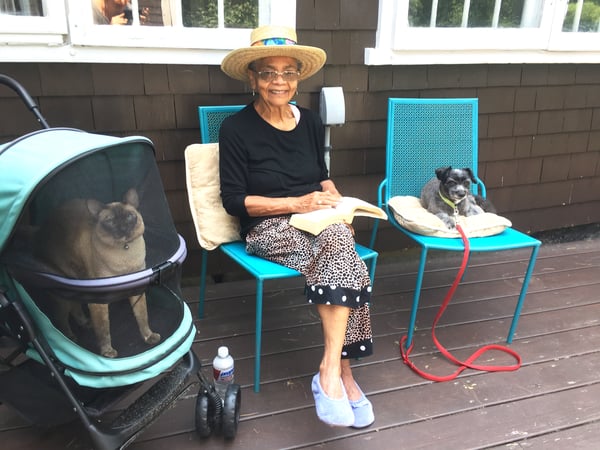
“Aunt Harriett came from an incredibly loving mom and dad and a multi-racial family. So her heritage and background is very unique, especially when it comes to medical conditions and research. Aunt Harriett feels so proud to be a part of the study because she knows the importance of diversity in research and she’s glad she can help others,” Anissa says.
While in that role, he helped to create legislation in Massachusetts providing resources for better care and support of people living with Alzheimer’s.
“Fifty percent of those living with Alzheimer’s are undiagnosed,” Daniel says. “So we worked on a piece of legislation called the Alzheimer’s and Dementia Act to try and address the root of that problem. We looked at the hospital care setting experience, the lack of diagnosis and lack of information provided after diagnosis. Then we put our findings about the solutions to those problems into one big bill that passed in 2018 and now mandates that medical professionals get medical training in Alzheimer’s and dementia as part of their licensure, among other things.”
Now that he’s experiencing dementia on a personal level through Aunt Harriett, Daniel says it has become even more apparent to him that even when you’re informed about the disease you can never fully prepare yourself for what it’s going to be like.
“We’re lucky that my sister is an incredible caregiver. No one can anticipate what they’re going to be dealing with but I’m really happy we’ve been able to support my Aunt Harriett,” he says. “It hasn’t been easy but it’s been a meaningful experience for everyone, and the hope and optimism that the Memory and Aging Program provides is really good for families. Even as they’re working toward a cure, just having a team to check in with and to have a care plan is amazing. Even if the outcome of the research doesn’t turn out to be what you were hoping for, having that support along the way really makes a difference.”
Anissa echoes Daniel’s thoughts about the experience.
“To do this meant a lot to all of us during a time when we didn’t know what to do, and all during an unprecedented pandemic,” she says. “Everyone needs hopes and dreams, so you can keep moving forward, and that’s what the Memory and Aging Program did for us.”
“Aunt Harriett has hopes and dreams for everyone and every family that is affected by Alzheimer’s. She did have a hope that there would have been a cure for her, but she knows this is not so at this time, and it is her dream through her study work and donation to the Memory and Aging Program, that she is giving hopes and dreams to many others.”
“My Aunt Harriett would like to thank everyone from Butler’s Memory and Aging Program from the most special place in her heart. It has brought her tremendous joy to travel down
to visit with her friends and found solace in knowing she received the best care she could. Thank you from myself and my beloved Aunt Harriett.”
Disclaimer: The content in this blog is for informational and educational purposes only and should not serve as medical advice, consultation, or diagnosis. If you have a medical concern, please consult your healthcare provider or seek immediate medical treatment.
Copyright © 2026 Care New England Health System